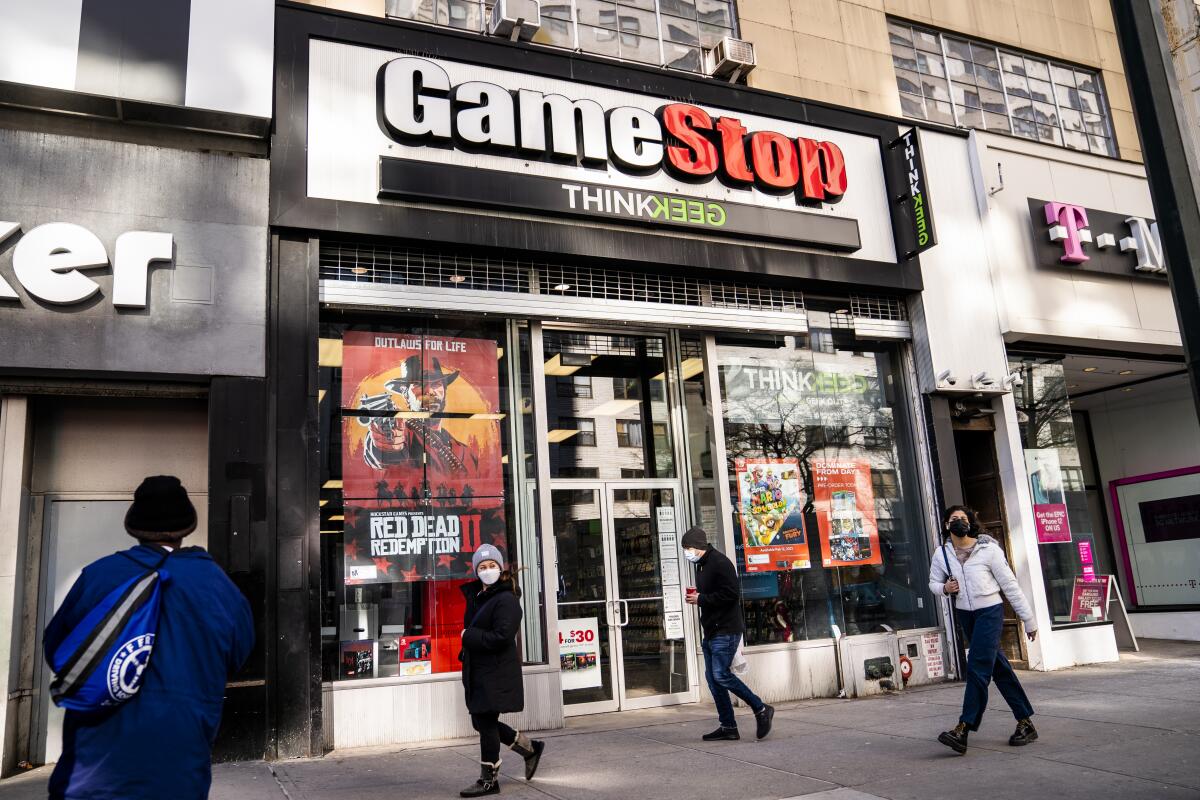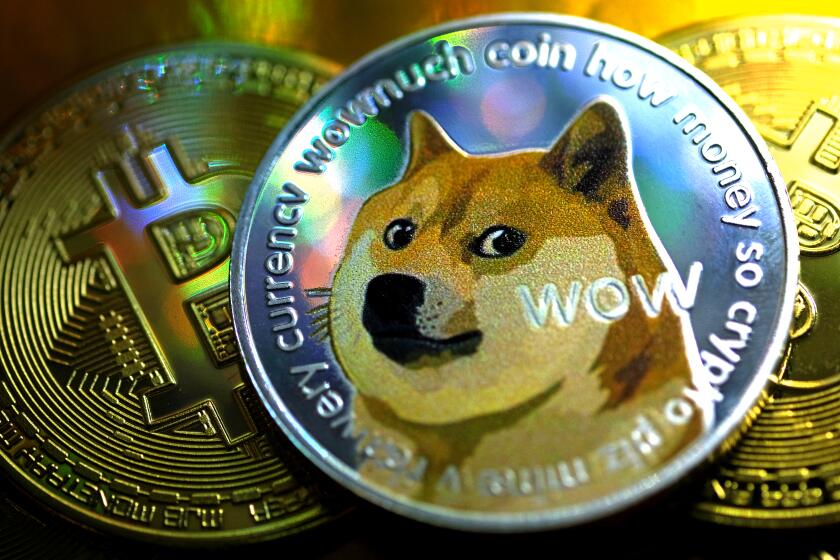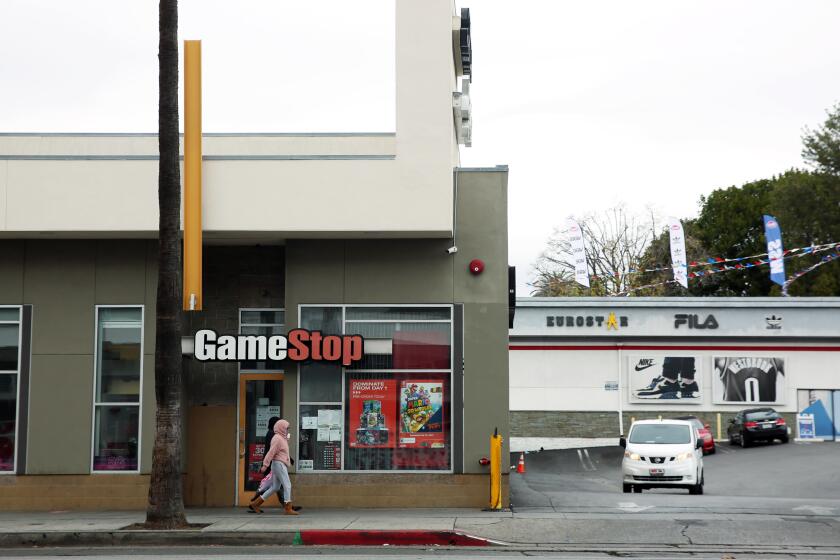Remember the GameStop stock craze? Looks like it’s over

- Share via
Just about one year ago, a consumer chain lumbering its way toward business irrelevancy suddenly became the lodestar of a stock market craze.
GameStop, a money-losing video- and computer-game retailer with 5,000 stores facing a bleak future as game-buying shifted from physical products to digital downloads, seemingly had nowhere to go but down. Short sellers had piled into its stock, betting that it was on a glide path to extinction.
Suddenly, in January 2021, the shares took off. On the first trading day of that year, they closed at $17.25. On Jan. 29, they closed at $325, a day after hitting an intraday peak of $483. On Monday, they fell $6.21 or 5.8%, to $100.15, their lowest level since Feb. 24, 2021.
The race is not always to the swift, nor the battle to the strong; but that’s the way to bet.
— Sportswriter Hugh Keogh
In 2021, GameStop became the emblematic “meme stock,” meaning that it was being pumped up by online stock pickers with a story to tell.
The GameStop story had several elements. One was related to the notion that short sellers, who borrow shares with the intention of selling them and eventually buying them back at a lower price to return to the lenders, are an illegitimate drag on the stock market.
Get the latest from Michael Hiltzik
Commentary on economics and more from a Pulitzer Prize winner.
You may occasionally receive promotional content from the Los Angeles Times.
Another was that short sellers were chiefly rich hedge funds and vulnerable to a “short squeeze,” in which a stock is driven up, forcing the shorts to buy back in at a higher price, which puts them in the red. That meant that buying into GameStop was a way for the little guy to put it to the Man.
A third was that GameStop had come under the control of Ryan Cohen, a visionary investor who was going to lead the company into a new-technology nirvana.
None of these elements was true. As I’ve written before, short-selling is healthy for the stock market. That’s because unalloyed optimism, which is what’s generally purveyed by corporate executives, is unhealthy for capitalism, just as living on a diet exclusively of Twinkies would be for you or me.
Has any era given birth to more dubious investment mechanisms than today?
Short sellers provide a necessary corrective to this tendency — it was shorts who sounded early alarms about Enron and other artifacts of corporate criminality.
Although one hedge fund is known to have taken a bath in the GameStop short squeeze, indications are that many others made money on the shares as they rose. The GameStop meme investors were just putting money in their pockets.
As for Cohen’s vision, so far, no dice. After becoming GameStop’s largest investor, Cohen became its chairman in early January 2021 and proceeded to clean house, filling the board and the corporate suite with his associates.
Over the first nine months of 2021, the company increased sales to $3.76 billion from $3 billion a year earlier, but narrowed its loss only modestly to $234 million from $295 million.
In the third quarter, which ended Oct. 30, sales rose to $1.3 billion from about $1 billion in the same period a year earlier, but the quarterly loss also increased to $105.4 million from $19 million a year earlier.
The company attributed the results to customers’ shifts to higher-priced but lower-margin hardware and to “increased freight and credit card fees associated with the shift to e-commerce sales.”
Most recently, as it happens, the company has opened a website for consumers to trade nonfungible tokens, another “meme” investment vehicle, and has indicated that it’s looking to jump into the cryptocurrency markets. Those ventures both sound as if Cohen is still searching for GameStop’s holy grail.
GameStop theories are about a dime a dozen, and that’s what they’re worth.
In any case, the news about GameStop’s new directions didn’t do anything to goose the shares higher. The Wall Street Journal telegraphed the company’s new direction Jan. 6. The shares closed at $131.03 that day and have lost 30% of their value since then.
GameStop isn’t the only meme stock to come back to Earth. AMC Entertainment, which owns movie theaters coast to coast, traded as high as $72.62 on June 2. On Monday the shares fell $1.33, or 7.4%, to $16.64. Bloomberg’s index of 37 meme stocks has lost 20% just in the last week.
Other meme investments have also lost their shine. As I type these words, Bitcoin, the bellwether cryptocurrency, is priced at $36,735, down from $51,000 a month ago and 48% from its Nov. 9 peak of $69,000.
Special purpose acquisition companies, or SPACs — another investment tool untethered from traditional valuation principles, have been crashing; the Bloomberg index of those things has lost 68% since last February and more than 33% so far this year. (As I conjectured in mid-December, Donald Trump’s SPAC deal may have been the sector’s last gasp.)
That brings us back to GameStop and the question of how its retail investors — those drivers of the frenzy — fared over the last year. The short answer is: Not so hot.
A cryptocurrency company thinks it will get a boost from putting its name on the Lakers’ arena. History begs to differ.
It’s true that GameStop is still trading higher than the $65.01 closing price on Jan. 22, 2021, when the frenzy can be said to have started with a trading volume of 197 million shares — an amazing figure for a stock that averaged closer to about 6 million shares a day.
But it’s safe to say that if you were the average investor, you didn’t buy in at $65.01. You jumped on the speeding train at $150, or $325, or even at the peak of $483. If you were a member of that club and hung on, today you’re deep in the red.
Veteran observers of the investment markets aren’t especially surprised at this trendline. The first red flag for them may have been the implication that something new was happening in the stock market — that small investors, organized through online forums such as Reddit’s WallStreetBets, were finally seizing control after being treated for decades as no more than toads beneath the harrow (to cite Rudyard Kipling).
The idea that “this time is different” is always a warning to run for the hills. On Wall Street, nothing is new under the sun: The house always wins, in the end. That doesn’t mean that the little guys can’t also make a profit, but if they think they’re going to take control, they’re asking to be thrashed but good.
The second principle to keep in mind is that bubbles can’t remain inflated forever. When they’ll burst is generally hard to predict, but the longer they last, the more remote they become from reality, and the more suckers they lure in.
It isn’t entirely out of the realm of possibility that GameStop, AMC, crypto and other fad investments will someday grow to meet their fans’ expectations, just as it sometimes happens that people on fad diets lose weight. It’s also possible that the meme stocks will again become the cynosures of online promoters.
But just as fad dieters generally bulk up again, fad investments are more likely than not to end in tears — for everyone, that is, except their promoters. (On the other hand, sometimes the promoters end up in jail.)
The shortcuts to wealth are a lot more rare than you think. The old-time sportswriter Hugh Keogh had it right in his gloss on Ecclesiastes: “The race is not always to the swift, nor the battle to the strong; but that’s the way to bet.”
More to Read
Get the latest from Michael Hiltzik
Commentary on economics and more from a Pulitzer Prize winner.
You may occasionally receive promotional content from the Los Angeles Times.













